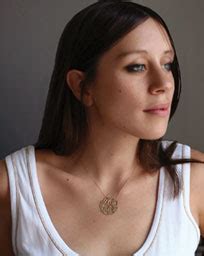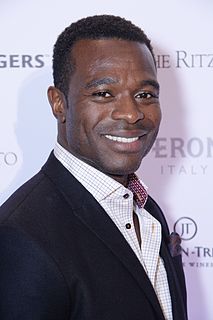A Quote by Kate Chopin
He could see plainly that she was not herself. That is, he could not see that she was becoming herself and daily casting aside that fictitious self which we assume like a garment with which to appear before the world.
Related Quotes
There was a warmth of fury in his last phrases. He meant she loved him more than he her. Perhaps he could not love her. Perhaps she had not in herself that which he wanted. It was the deepest motive of her soul, this self-mistrust. It was so deep she dared neither realise nor acknowledge. Perhaps she was deficient. Like an infinitely subtle shame, it kept her always back. If it were so, she would do without him. She would never let herself want him. She would merely see.
He began to trace a pattern on the table with the nail of his thumb. "She kept saying she wanted to keep things exactly the way they were, and that she wished she could stop everything from changing. She got really nervous, like, talking about the future. She once told me that she could see herself now, and she could also see the kind of life she wanted to have - kids, husband, suburbs, you know - but she couldn't figure out how to get from point A to point B.
I value in the cat the independent and almost ungrateful spirit which prevents her from attaching herself to any one, the indifference with which she passes from the salon to the housetop. When we caress her, she stretches herself and arches her back responsively; but this is because she feels an agreeable sensation, not because she takes a silly satisfaction, like the dog, in faithfully loving a thankless master. The cat lives alone, has no need of society, obeys only when she pleases, pretends to sleep that she may see more clearly, and scratches everything on which she can lay her paw.
I took one glance at her in that hospital bed under the dull light and recognised the look on her face, which I'd seen on donors often enough before. It was like she was willing her eyes to see right inside herself, so she could patrol and marshal all the better the separate areas of pain in her body.
The adversary she found herself forced to fight was not worth matching or beating; it was not a superior ability which she would have found honour in challenging; it was ineptitude - a grey spread of cotton that seemed soft and shapeless, that could offer no resistance to anything or anybody, yet managed to be a barrier in her way. She stood, disarmed, before the riddle of what made this possible, she could find no answer.
She had witnessed the world's most beautiful things, and allowed herself to grow old and unlovely. She had felt the heat of a leviathan's roar, and the warmth within a cat's paw. She had conversed with the wind and had wiped soldier's tears. She had made people see, she'd seen herself in the sea. Butterflies had landed on her wrists, she had planted trees. She had loved, and let love go. So she smiled.
It seemed to Alabama that, reaching her goal, she would drive the devils that had driven her - that, in proving herself, she would achieve that peace which she imagined went only in surety of one’s self - that she would be able, through the medium of the dance, to command her emotions, to summon love or pity or happiness at will, having provided a channel through which they might flow. She drove herself mercilessly, and the summer dragged on.
She imagined herself both queen and slave, dominatrix and victim. In her imagination she was making love with men of all skin colors--white, black, yellow--with homosexuals and beggars. She was anyone's, and anyone could do anything to her. She had one, two, three orgasms, one after another. She imagined everything she had never imagined before, and she gave herself to all that was most base and most pure.
It was so important that women were involved in 'She's Gotta Have It' because it's about a woman's opinion. It's about her views of herself, and the world around her, and how the world perceives her, and finding that ground for herself - not even a common ground, but that ground for herself in which she can walk on firmly with confidence.
So she had to satisfy herself with the idea of love - loving the loving of things whose existence she didn't care at all about. Love itself became the object of her love. She loved herself in love, she loved loving love, as love loves loving, and was able, in that way, to reconcile herself with a world that fell so short of what she would have hoped for. It was not the world that was the great and saving lie, but her willingness to make it beautiful and fair, to live a once-removed life, in a world once-removed from the one in which everyone else seemed to exist.

































